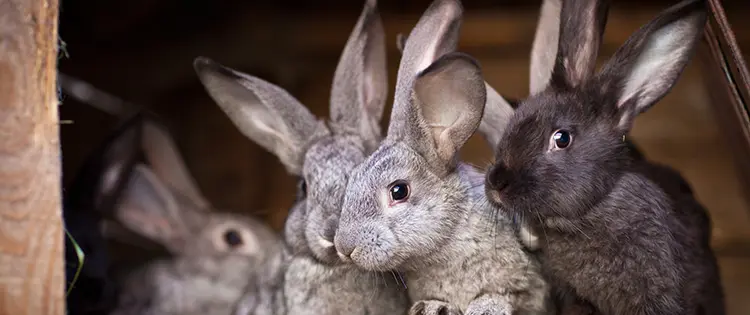Rabbits make the perfect livestock option for homesteaders. Not only are they cute and friendly creatures but there are several benefits to raising them. They’ve been imported around the globe for decades. People raise rabbits as pets, for wool, for meat, and for pelts. They also produce nutrient-rich manure that improves the quality of your backyard. Whatever you want to raise rabbits for, here are some helpful tips to assist you.
The Benefits of Raising Rabbits
Everyone loves rabbits, they are popular pets because they’re so sociable and loving. They’re unique with vibrant personalities and make excellent companions. But for homesteaders, they are a lot more than adorable bundles of joy. Here are some of the benefits of raising rabbits:
- Garden Ready Manure: Rabbit droppings are cold, which means that they can go directly onto the land without composting it. Research conducted by Michigan State University found that rabbit manure is full of potassium, phosphorous, nitrogen, cobalt, copper, sulfur, manganese, zinc, boron, magnesium, calcium, and many other micronutrients and minerals that are exceptionally beneficial for growing vegetables and plants.
- Rabbits Are Cheap: Excluding the cost of buying feeders, cages, water bottles, and the other equipment required to care for rabbits, they are very cheap to raise. You can even grow most of their food, your feeding bill will go up during the winter months when you can’t grow as much, but the price is still relatively low in comparison to other animals.
- Rabbits Will Make You Money: Whether you’re breeding rabbits for meat, wool, or you’re selling bunnies, you can make a very decent living with rabbits.
- Rabbits Are Breeders: When you have rabbits, you’ll never be short of rabbits! They breed naturally without any assistance; you won’t need to set up incubators or give them special food. Basically, if the world were to shut down, you’d have meat forever!
Different Rabbit Breeds
There are several different rabbit breeds, and they all serve their purpose. Here are some of the best for homesteaders:
- New Zealand Whites
These are the most popular rabbits for meat, they weigh approximately 9 to 12 pounds.
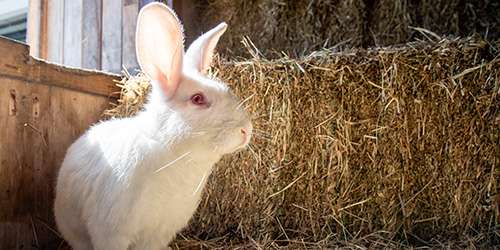
- Californian Rabbits
They are a cross between New Zealand Whites and Chinchilla rabbits; they are a stocky breed and weigh between 8 to 12 pounds.

- American Chinchilla
Chefs worldwide have a preference for cooking and smoking this rabbit meat. Adult Chinchillas don’t weigh any more than 9 pounds.
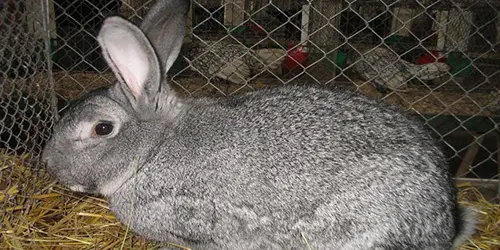
- Flemish Giants
These rabbits love to eat, and it will cost you slightly more to feed them. But they are called giants for a reason and weigh up to 20 pounds.

- Rex Rabbits
These rabbits have the most splendid, thick fur, it’s typically used for making linings and outerwear.
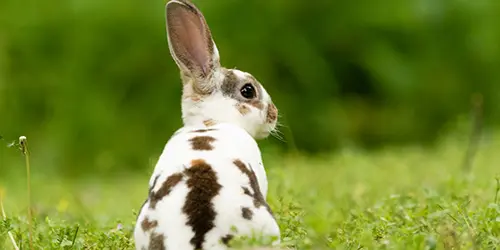
- Silver Foxes
Although a rare breed, homesteaders love these rabbits. They typically weigh between 10 and 12 pounds.
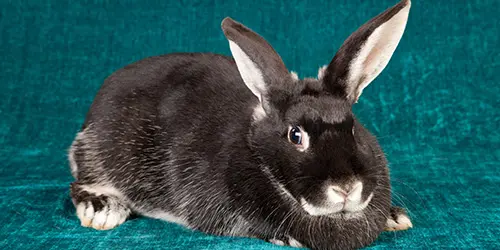
How to Feed Rabbits
Rabbits are herbivores, which means they eat plants. They are also grazers, which means they eat all the time. Their digestive systems are complicated, and they process foods very well when fed correctly. So that your rabbits grow strong and healthy, you’ll need to feed them the right diet. Here are some tips:
Foods to Feed Your Rabbits
Here are the main foods you will need to feed your rabbits:
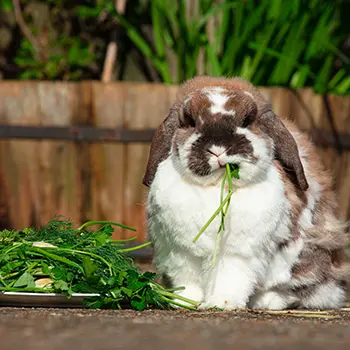
- Grass and Hay: Each rabbit should have one bundle of hay the same size as them. Make sure it’s fresh, and of good quality; they will also need grass to nibble on, growing grass is preferred, if not, kiln-dried grass will do.
- Leafy Greens: Every day, they will need one handful of leafy green vegetables, weeds, and herbs. This could include mint, parsley, broccoli, kale, or cabbage.
- Pellets/Nuggets: Feed them no more than two full eggcups of pellets/nuggets per day. An eggcup is around 25 grams.
- Treats: Give your rabbits occasional treats, these can include carrots and apples, but do so in small amounts.
- Water: Rabbits need access to water 24/7, you can leave the water in a large ceramic bowl, or in a water bottle. But in general, rabbits have a preference for water bowls. Make sure the water doesn’t get algae in it during the summer months, and that it doesn’t freeze during the winter months. If you choose to use water bottles, check them daily to make sure the tip is not blocked.
Foods Not to Feed Your Rabbits
As mentioned, rabbits have complicated digestive systems, and when they eat the wrong foods, it quickly disrupts the healthy bacteria which can lead to an overgrowth of toxic bacteria. This can cause rabbits to get sick, and in some cases die. There are many foods that you should avoid feeding your rabbits, here are some of them:
- Sugary high carb treats: Foods like crackers, cookies, pasta, and bread are full of sugar and high in carbohydrates, do not feed them to your rabbits. They can cause enterotoxemia which is a form of blood poisoning.
- Iceberg Lettuce: Shocking right?! Considering the fact that lettuce is a vegetable (a green one at that), you would have thought it would be on the list of safe foods. Rabbits can’t eat iceberg lettuce because it contains a chemical called lactucarium which is harmful to their gut.
- Cereal: Cereals such as muesli and granola are full of seeds, grains, pellets, peas, and flaked maize. They will cause your rabbit’s tummy and tooth problems.
- Walnuts: The high fiber and fat content in walnuts will give your rabbits uncomfortable indigestion.
- Potatoes: Potatoes are high in starch and high in carbohydrates.
How to Protect Rabbits From Predators
Unfortunately, there are some animals who love rabbits just as much as you do, but for the wrong reasons. Rabbits are prey animals, and foxes, raccoons, dogs, cats, and hawks are just a few of the predators you’ll need to protect your rabbits from. Here are some tips:
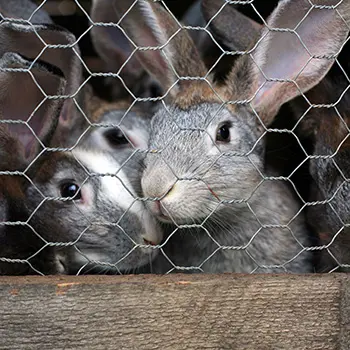
- A Sturdy Hutch: You will rarely find a sturdy hutch in a pet store, if you want hutches that will protect your rabbits, you’ll need to make them yourself, or have them made by a professional.
- Keep the Predators Out: Keep the grass cut, make sure the water is out of sight, make sure rubbish is not exposed, and keep your land tidy. Motion-detection lights will scare away nocturnal creatures such as foxes.
- Hawk Proof Exercise Pen: You can’t allow your rabbits to roam freely even when you are out and about. Hawks are not afraid of humans, and if they notice a rabbit, they’ll find their way onto your property and snatch it in front of you. You can protect your rabbits from hawks by making sure your rabbits exercise pen, or run is made out of strong wire mesh, or wood paneling. Additionally, birds do not like reflective shiny objects, one way of protecting your rabbits against hawks is to hang old CDs in your yard.
- A High Fence: Dogs and cats can jump into your yard, a 6.5-foot fence should be high enough to keep out the majority of dogs and cats. You will also need to bury the chicken wire at the base of the fence to prevent them from digging.
- Ultrasonic Alarms: Cats can’t handle noises of a certain frequency, an ultrasonic alarm will keep cats away by releasing a sound that will send them running back in the direction they came from.
- Motion Sprinklers: Cats can’t stand water, getting sprayed in the face is no fun to them. Motion sprinklers will start spraying water when something moves in the area. After a spray or two, cats will soon get the message that this is not the yard for them, and they’ll stop paying you a visit.
Final Thought
Now that you know how to feed and protect rabbits, it’s time to go out and buy some. These beautiful creatures will give you bundles of snuggly joy, and plenty of meat no matter what time of year it is.
You may also like:
Why You Should Raise Ducks Instead Of Chickens
This Homemade Device Can Power Up Your Entire House 7 Days in a Row (Video)
Easy DIY 165 Gallon Rain Harvester

